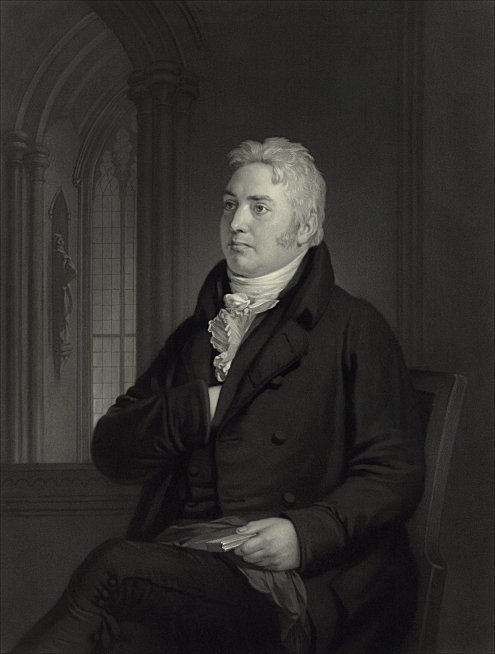Samuel Taylor Coleridge: The Nightingale

Samuel Taylor Coleridge
(1772-1834)
The Nightingale
A Conversational Poem
Written in April 1798
No cloud, no relique of the sunken day
Distinguishes the West, no long thin slip
Of sullen Light, no obscure trembling hues.
Come, we will rest on this old mossy Bridge!
You see the glimmer of the stream beneath,
But hear no murmuring: it flows silently
O’er its soft bed of verdure. All is still,
A balmy night! and tho’ the stars be dim,
Yet let us think upon the vernal showers
That gladden the green earth, and we shall find
A pleasure in the dimness of the stars.
And hark! the Nightingale begins its song,
"Most musical, most melancholy"[1] Bird!
A melancholy Bird? O idle thought!
In nature there is nothing melancholy.
–But some night-wandering Man, whose heart was pierc’d
With the remembrance of a grievous wrong,
Or slow distemper or neglected love,
(And so, poor Wretch! fill’d all things with himself
And made all gentle sounds tell back the tale
Of his own sorrows) he and such as he
First nam’d these notes a melancholy strain;
And many a poet echoes the conceit,
Poet, who hath been building up the rhyme
When he had better far have stretch’d his limbs
Beside a brook in mossy forest-dell
By sun or moonlight, to the influxes
Of shapes and sounds and shifting elements
Surrendering his whole spirit, of his song
And of his fame forgetful! so his fame
Should share in nature’s immortality,
A venerable thing! and so his song
Should make all nature lovelier, and itself
Be lov’d, like nature!–But ’twill not be so;
And youths and maidens most poetical
Who lose the deep’ning twilights of the spring
In ball-rooms and hot theatres, they still
Full of meek sympathy must heave their sighs
O’er Philomela’s pity-pleading strains.
My Friend, and my Friend’s Sister! we have learnt
A different lore: we may not thus profane
Nature’s sweet voices always full of love
And joyance! ‘Tis the merry Nightingale
That crowds, and hurries, and precipitates
With fast thick warble his delicious notes,
As he were fearful, that an April night
Would be too short for him to utter forth
His love-chant, and disburthen his full soul
Of all its music! And I know a grove
Of large extent, hard by a castle huge
Which the great lord inhabits not: and so
This grove is wild with tangling underwood,
And the trim walks are broken up, and grass,
Thin grass and king-cups grow within the paths.
But never elsewhere in one place I knew
So many Nightingales: and far and near
In wood and thicket over the wide grove
They answer and provoke each other’s songs–
With skirmish and capricious passagings,
And murmurs musical and swift jug jug
And one low piping sound more sweet than all–
Stirring the air with such an harmony,
That should you close your eyes, you might almost
Forget it was not day! On moonlight bushes,
Whose dewy leafits are but half disclos’d,
You may perchance behold them on the twigs,
Their bright, bright eyes, their eyes both bright and full,
Glistning, while many a glow-worm in the shade
Lights up her love-torch.
A most gentle maid
Who dwelleth in her hospitable home
Hard by the Castle, and at latest eve,
(Even like a Lady vow’d and dedicate
To something more than nature in the grove)
Glides thro’ the pathways; she knows all their notes,
That gentle Maid! and oft, a moment’s space,
What time the moon was lost behind a cloud,
Hath heard a pause of silence: till the Moon
Emerging, hath awaken’d earth and sky
With one sensation, and those wakeful Birds
Have all burst forth in choral minstrelsy,
As if one quick and sudden Gale had swept
An hundred airy harps! And she hath watch’d
Many a Nightingale perch giddily
On blosmy twig still swinging from the breeze,
And to that motion tune his wanton song,
Like tipsy Joy that reels with tossing head.
Farewell, O Warbler! till to-morrow eve,
And you, my friends! farewell, a short farewell!
We have been loitering long and pleasantly,
And now for our dear homes.–That strain again!
Full fain it would delay me!–My dear Babe,
Who, capable of no articulate sound,
Mars all things with his imitative lisp,
How he would place his hand beside his ear,
His little hand, the small forefinger up,
And bid us listen! And I deem it wise
To make him Nature’s playmate. He knows well
The evening star: and once when he awoke
In most distressful mood (some inward pain
Had made up that strange thing, an infant’s dream)
I hurried with him to our orchard plot,
And he beholds the moon, and hush’d at once
Suspends his sobs, and laughs most silently,
While his fair eyes that swam with undropt tears
Did glitter in the yellow moon-beam! Well–
It is a father’s tale. But if that Heaven
Should give me life, his childhood shall grow up
Familiar with these songs, that with the night
He may associate Joy! Once more farewell,
Sweet Nightingale! once more, my friends! farewell.
Samuel Taylor Coleridge: The Nightingale
![]()
kempis poetry magazine
More in: Coleridge, Samuel Taylor

